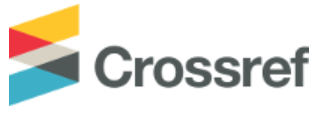The Online Tutorials Evaluation in Education Statistics Course at Pokjar Kendal Indonesia
Abstract
The implementation of online tutorials introduces difficulties in the learning process. Along with studying lecture material, students must also master technology. On this basis, an evaluation of the Education Statistics course is necessary. This evaluation focuses on implementing online tutorials and the factors that impede their implementation. This study aims to determine the quality of online tutorials available for the Education Statistics course. The research subjects are students from the Universitas Terbuka at Pokjar Kaliwungu and Kendal. This study is categorized as a qualitative descriptive study. Observation sheets, questionnaires, and interviews were used to collect data. The findings indicated that: 1) 47.1 percent of students use learning resources in the form of books, 47.1 % use learning videos, 70.6 % use websites, and 38.2 % use other sources;2) most students (61.8 %) struggle with hypothesis testing material, while 64.7 % struggle with linear regression analysis material; and 3) the difficulty of the material is because the material is difficult to understand by 35.3%; high difficulty by 50%; students have never been 35.3%; high material complexity by 29.4% and other 5.9%. Based on the findings of these studies, it can be concluded that there are still a significant number of students who struggle with the material covered in Education Statistics. The analysis suggests that: 1) lecturers should focus on hypothesis testing and linear regression analysis material in the tutorial to help students overcome difficulties; and 2) lecturers emphasize the application of statistics in research.
Keywords
Full Text:
PDFReferences
Afgani, M. W., Darmawijoyo, D., & Purwoko, P. (2008). Pengembangan media website pembelajaran materi program linear untuk siswa sekolah menengah atas. Jurnal Pendidikan Matematika, 2(2), 45–59. https://doi.org/10.22342/jpm.2.2.302.
Genkova, P., & Schreiber, H. (2021). Accept and apply diversity? An exploratory study of the attitudes towards diversity of students of STEM subjects. SN Social Sciences, 1(2), 1–22. https://doi.org/10.1007/s43545-021-00064-2
Kwon, H., Capraro, R. M., & Capraro, M. M. (2021). When i believe, i can: Success STEMs from my perceptions. Canadian Journal of Science, Mathematics and Technology Education, 21(1), 67–85. https://doi.org/10.1007/s42330-020-00132-4
Margot, K. C., & Kettler, T. (2019). Teachers’ perception of STEM integration and education: a systematic literature review. International Journal of STEM Education, 6(1). https://doi.org/10.1186/s40594-018-0151-2
Movchun, V., Lushkov, R., & Pronkin, N. (2021). Prediction of individual learning style in e-learning systems: Opportunities and limitations in dental education. Education and Information Technologies, 26(3), 2523–2537. https://doi.org/10.1007/s10639-020-10372-4
Purnomo, E. A, Pramudibyanto, H., & Lestariningsih, E. D. (2017). Evaluasi pelaksanaan tutorial tatap muka matakuliah matematika pada UPBJJ-UT Semarang. Jurnal Karya Pendidikan Matematika, 4(1), 76-82. https://doi.org/10.26714/jkpm.4.1.2017.%25p
Purnomo, E. A., Suparman, S., & Kadarwati, S. (2020). Developing web-based teaching material supplements to improve higher order thinking skills (HOTs) in mathematics courses. Jurnal Ilmu-Ilmu Sejarah, Sosial, Budaya Dan Kependidikan, 7(1), 118–127. https://doi.org/10.4108/eai.20-9-2019.2292123
Purnomo, E. A., Dalyono, B., & Lestariningsih, E. D. (2021). Developing e-learning media on education statistics subject. Journal of Physics: Conference Series, 1918(4). https://doi.org/10.1088/1742-6596/1918/4/042116
Purnomo, E. A., Winaryati, E., Hidayah, F. F., Utami, T. W., Ifadah, M., & Prasetyo, M. T. (2020). The implementation of Maple software to enhance the ability of students’ spaces in multivariable calculus courses. Journal of Physics: Conference Series, 1446(1), 0–6. https://doi.org/10.1088/1742-6596/1446/1/012053
Purnomo, E. A., Prihaswati, M., Dalyono, B., Handayani, S., Concepts, I., & Statistics, E. (2018, 14 July). Analyzing Student’s errors in resolving questions of statistics education in Pokjar Boja. International Seminar on Education and Development of Asia, pp. 332–336. https://jurnal.unimus.ac.id/index.php/psn12012010/article/view/4647/4185
Sahusilawane, W., & Hiariey, L. S. (2014). Evaluasi pelaksanaan tutorial tatap muka pendidikan dasar di kabupaten seram bagian barat pada UPBJJ-UT Ambon. Jurnal Pendidikan Terbuka dan Jarak Jauh, 15(1), 54–61. https://jurnal.ut.ac.id/index.php/jptjj/article/view/589/572
Sugiran, Pardamean Daulay, B. Z. (2015, 14 November). Tantangan dan peran teknologi pembelajaran dalam transformasi pendidikan di era digital. Seminar Nasional Teknologi Pendidikan UM, pp. 637–655. https://library.unibba.ac.id/2020/06/02/tantangan-peran-teknologi-pembelajaran-dalam-transformasi-pendidikan-di-era-digital/
Sugiran, S., Daulay, P., Zaman, B., Effendy, F., & Amalia, L. (2016). Evaluasi tutor online untuk meningkatkan kualitas layanan tutorial tatap muka pada pendidikan jarak jauh. Journal of Information Systems Engineering and Business Intelligence, 2(1), 1. https://doi.org/10.20473/jisebi.2.1.1-10
Sukestiyarno, Y. L. (2020). Metode Penelitian Pendidikan (2nd ed). Unnes Press.
Susanti, W. D., & Suripah. (2021). The effectiveness of website as a mathematics learning media during the online learning period. Edumatica: Jurnal Pendidikan Matematika, 11(01), 73-83. https://doi.org/10.22437/edumatica.v11i01.12225
Ulfah, A. M., & R. M. (2012). Meningkatkan hasil belajar matematika siswa dengan pembelajaran menggunakan aplikasi moodle. PYTHAGORAS: Jurnal Program Studi Pendidikan Matematika, 7(1), 73-82. https://doi.org/10.21831/pg.v7i1.2838
Zhang, H., Huang, T., Liu, S., Yin, H., Li, J., Yang, H., & Xia, Y. (2020). A learning style classification approach based on deep belief network for large-scale online education. Journal of Cloud Computing, 9(26), 1-17. https://doi.org/10.1186/s13677-020-00165-y
DOI: https://doi.org/10.31002/ijome.v5i1.5606
Refbacks
- There are currently no refbacks.
Copyright (c) 2022 Indonesian Journal of Mathematics Education

This work is licensed under a Creative Commons Attribution-NonCommercial-ShareAlike 4.0 International License.

This work is licensed under a Creative Commons Attribution-NonCommercial-ShareAlike 4.0 International License.
Indexed by:
ISSN: 2654-3907 (print) | 2654-346X (online)
Jalan Kapten Suparman No.39, Magelang, Jawa Tengah, Indonesia 56116
Phone (0293) 364113 Fax. (0293) 362438
Website : http://jurnal.untidar.ac.id/index.php/ijome









